BMP3004 - Employee Motivation: Factors, Experiences, and Strategies
VerifiedAdded on 2023/06/17
|10
|2039
|143
Report
AI Summary
This report delves into the multifaceted aspects of employee motivation within the workplace, emphasizing the significance of understanding the factors that influence individuals' work performance and overall experience. It explores both the positive and negative elements that shape employee engagement, including financial stability through salary, career advancement opportunities, and the crucial impact of the work environment. The report also addresses negative factors such as workplace conflicts, a detrimental work atmosphere, and ineffective management practices, highlighting their potential to diminish employee motivation and productivity. Furthermore, the report proposes strategies for mitigating the impact of these negative factors, such as fostering open communication channels and cultivating a culture of trust and respect. The analysis draws upon Maslow's Hierarchy of Needs to provide a theoretical framework for understanding the diverse needs that drive employee behavior and motivation. This report offers a comprehensive overview of employee motivation, providing valuable insights for organizations seeking to enhance employee satisfaction and optimize workplace dynamics, and can be found with other helpful resources on Desklib.
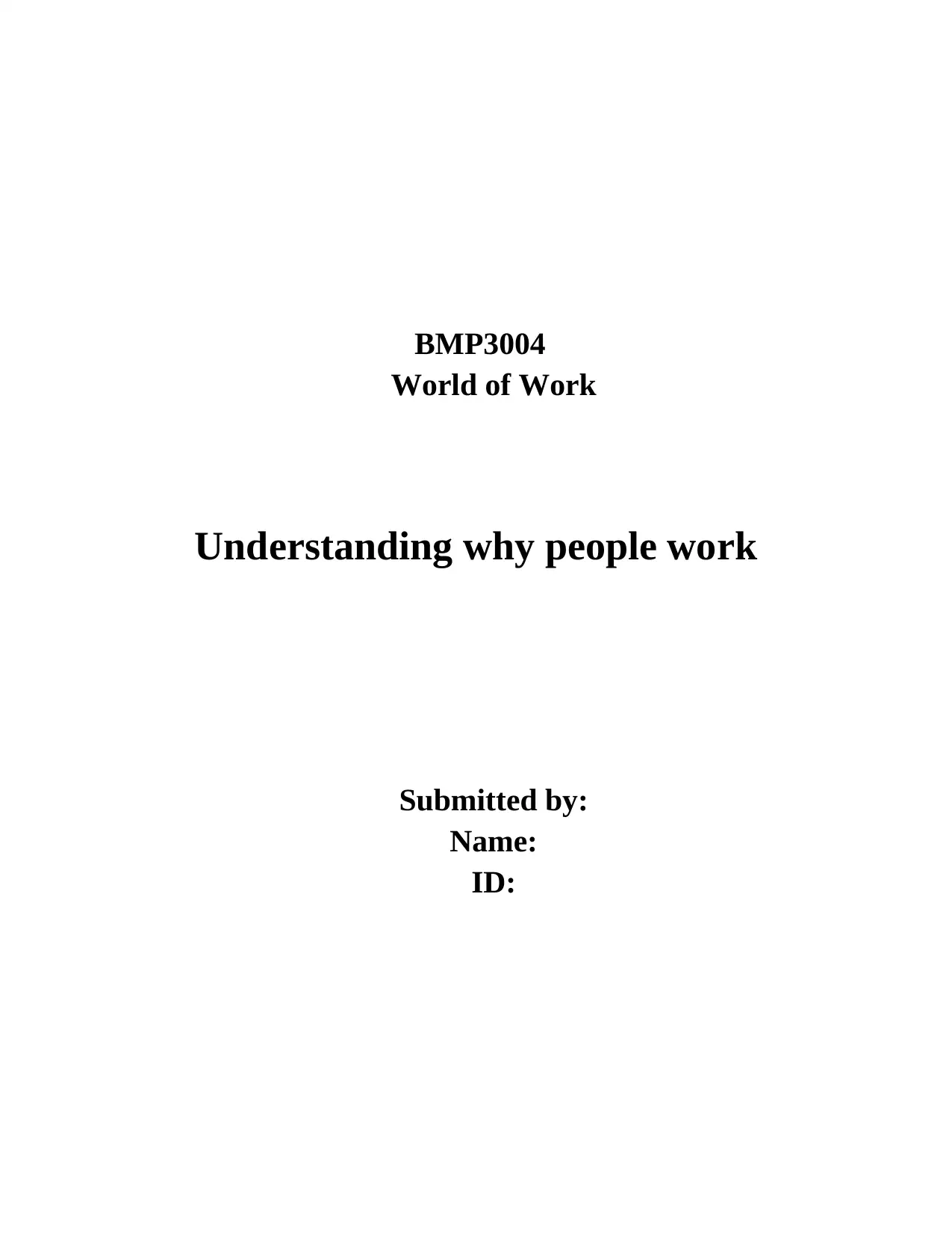
BMP3004
World of Work
Understanding why people work
Submitted by:
Name:
ID:
World of Work
Understanding why people work
Submitted by:
Name:
ID:
Paraphrase This Document
Need a fresh take? Get an instant paraphrase of this document with our AI Paraphraser
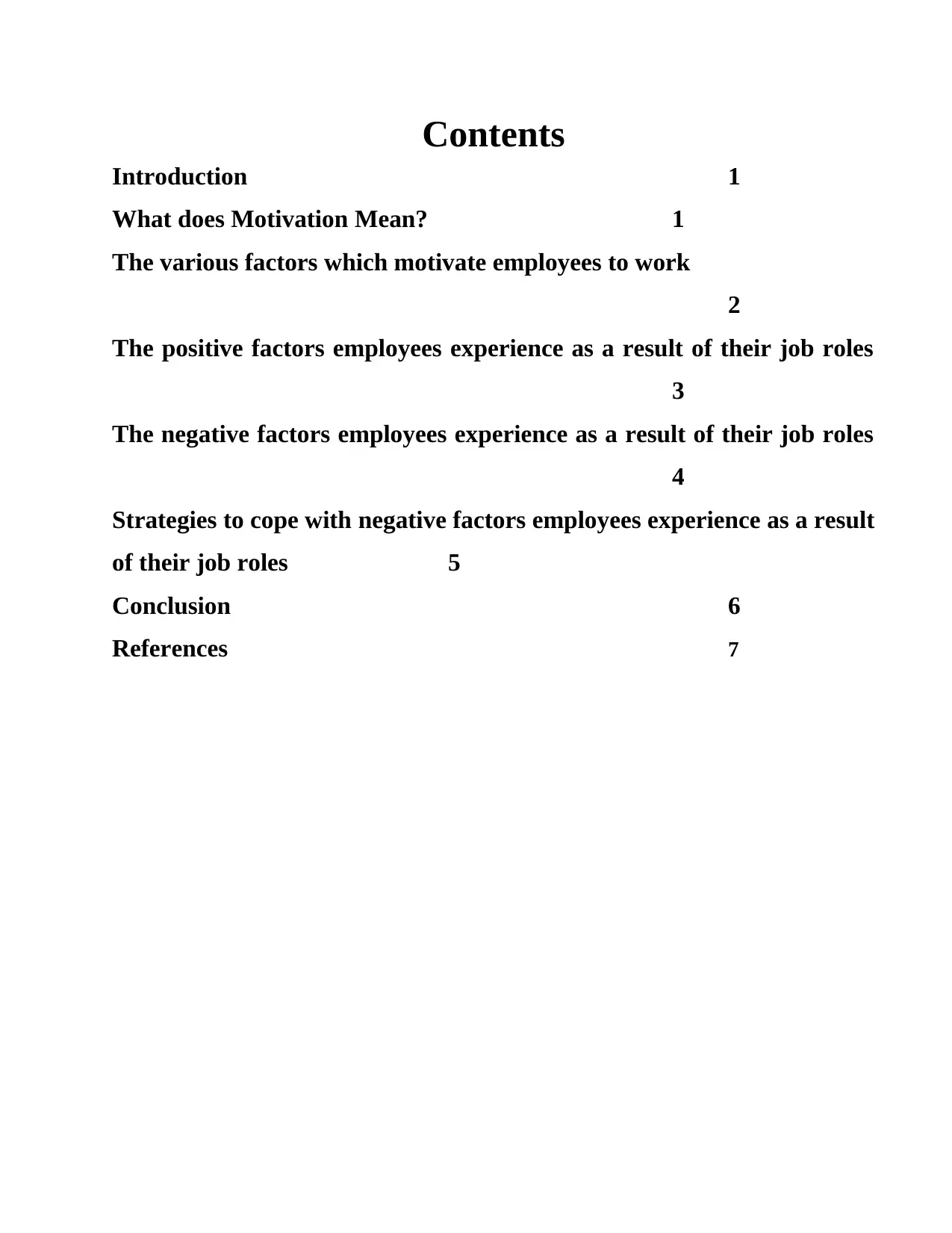
Contents
Introduction 1
What does Motivation Mean? 1
The various factors which motivate employees to work
2
The positive factors employees experience as a result of their job roles
3
The negative factors employees experience as a result of their job roles
4
Strategies to cope with negative factors employees experience as a result
of their job roles 5
Conclusion 6
References 7
Introduction 1
What does Motivation Mean? 1
The various factors which motivate employees to work
2
The positive factors employees experience as a result of their job roles
3
The negative factors employees experience as a result of their job roles
4
Strategies to cope with negative factors employees experience as a result
of their job roles 5
Conclusion 6
References 7
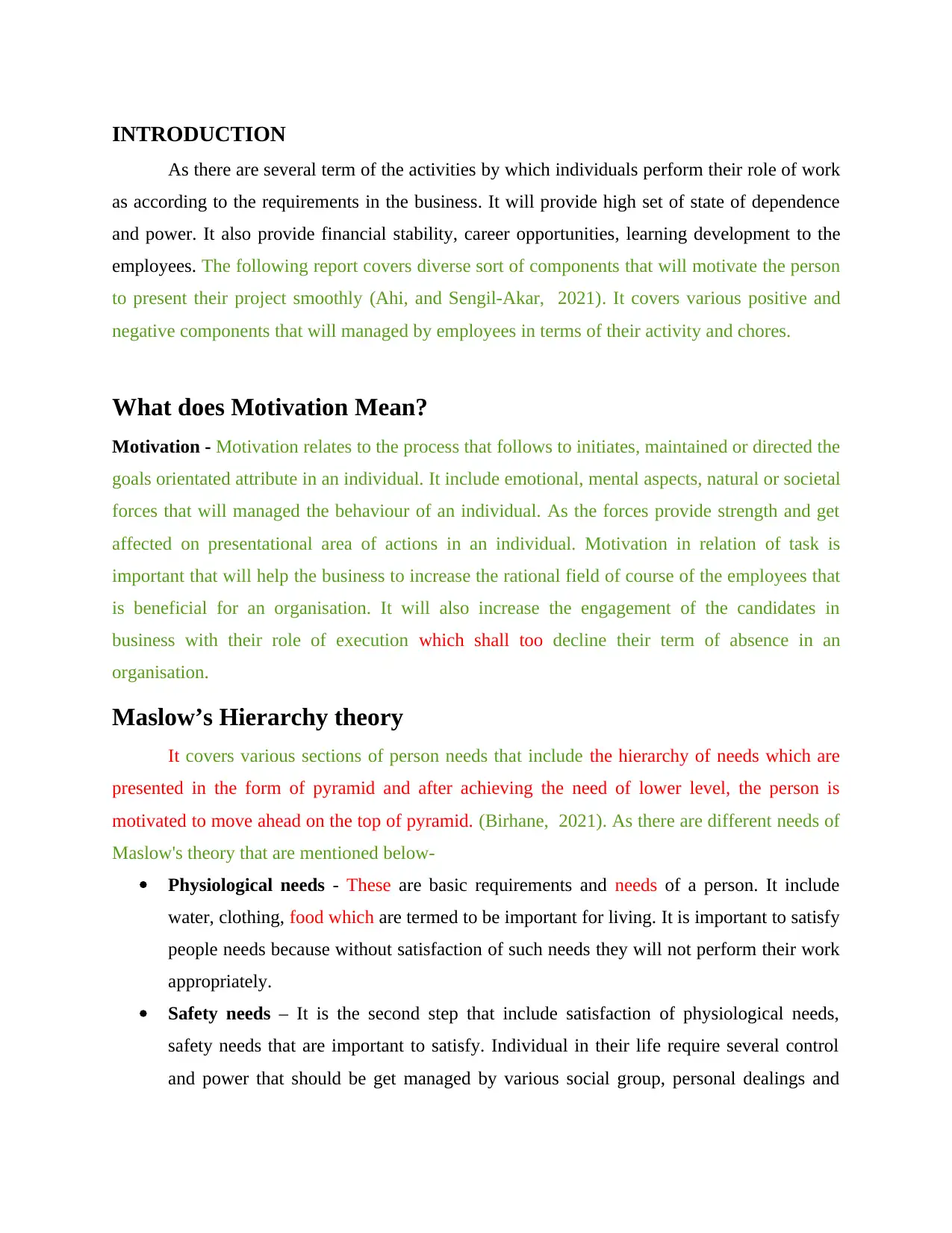
INTRODUCTION
As there are several term of the activities by which individuals perform their role of work
as according to the requirements in the business. It will provide high set of state of dependence
and power. It also provide financial stability, career opportunities, learning development to the
employees. The following report covers diverse sort of components that will motivate the person
to present their project smoothly (Ahi, and Sengil-Akar, 2021). It covers various positive and
negative components that will managed by employees in terms of their activity and chores.
What does Motivation Mean?
Motivation - Motivation relates to the process that follows to initiates, maintained or directed the
goals orientated attribute in an individual. It include emotional, mental aspects, natural or societal
forces that will managed the behaviour of an individual. As the forces provide strength and get
affected on presentational area of actions in an individual. Motivation in relation of task is
important that will help the business to increase the rational field of course of the employees that
is beneficial for an organisation. It will also increase the engagement of the candidates in
business with their role of execution which shall too decline their term of absence in an
organisation.
Maslow’s Hierarchy theory
It covers various sections of person needs that include the hierarchy of needs which are
presented in the form of pyramid and after achieving the need of lower level, the person is
motivated to move ahead on the top of pyramid. (Birhane, 2021). As there are different needs of
Maslow's theory that are mentioned below-
Physiological needs - These are basic requirements and needs of a person. It include
water, clothing, food which are termed to be important for living. It is important to satisfy
people needs because without satisfaction of such needs they will not perform their work
appropriately.
Safety needs – It is the second step that include satisfaction of physiological needs,
safety needs that are important to satisfy. Individual in their life require several control
and power that should be get managed by various social group, personal dealings and
As there are several term of the activities by which individuals perform their role of work
as according to the requirements in the business. It will provide high set of state of dependence
and power. It also provide financial stability, career opportunities, learning development to the
employees. The following report covers diverse sort of components that will motivate the person
to present their project smoothly (Ahi, and Sengil-Akar, 2021). It covers various positive and
negative components that will managed by employees in terms of their activity and chores.
What does Motivation Mean?
Motivation - Motivation relates to the process that follows to initiates, maintained or directed the
goals orientated attribute in an individual. It include emotional, mental aspects, natural or societal
forces that will managed the behaviour of an individual. As the forces provide strength and get
affected on presentational area of actions in an individual. Motivation in relation of task is
important that will help the business to increase the rational field of course of the employees that
is beneficial for an organisation. It will also increase the engagement of the candidates in
business with their role of execution which shall too decline their term of absence in an
organisation.
Maslow’s Hierarchy theory
It covers various sections of person needs that include the hierarchy of needs which are
presented in the form of pyramid and after achieving the need of lower level, the person is
motivated to move ahead on the top of pyramid. (Birhane, 2021). As there are different needs of
Maslow's theory that are mentioned below-
Physiological needs - These are basic requirements and needs of a person. It include
water, clothing, food which are termed to be important for living. It is important to satisfy
people needs because without satisfaction of such needs they will not perform their work
appropriately.
Safety needs – It is the second step that include satisfaction of physiological needs,
safety needs that are important to satisfy. Individual in their life require several control
and power that should be get managed by various social group, personal dealings and
⊘ This is a preview!⊘
Do you want full access?
Subscribe today to unlock all pages.

Trusted by 1+ million students worldwide
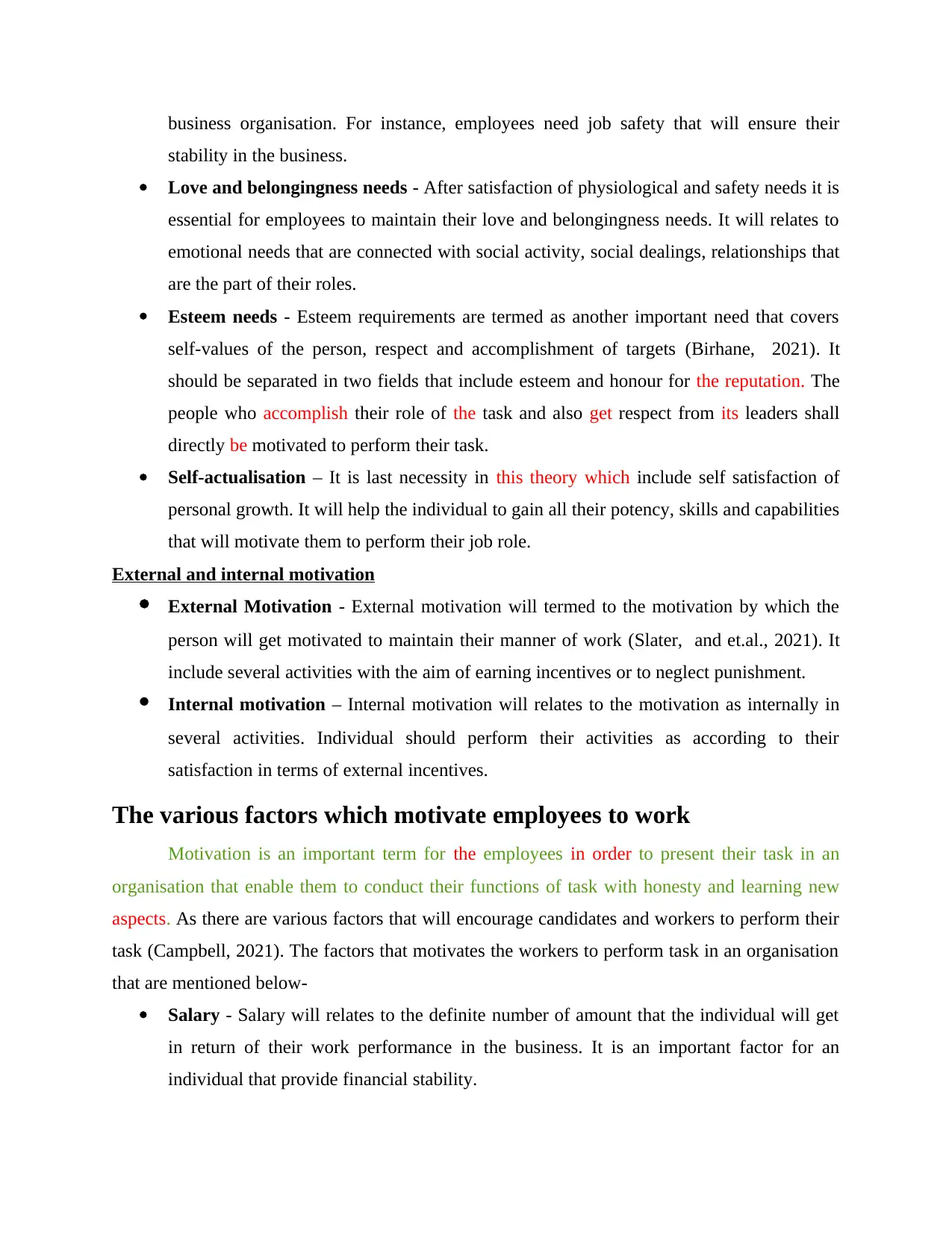
business organisation. For instance, employees need job safety that will ensure their
stability in the business.
Love and belongingness needs - After satisfaction of physiological and safety needs it is
essential for employees to maintain their love and belongingness needs. It will relates to
emotional needs that are connected with social activity, social dealings, relationships that
are the part of their roles.
Esteem needs - Esteem requirements are termed as another important need that covers
self-values of the person, respect and accomplishment of targets (Birhane, 2021). It
should be separated in two fields that include esteem and honour for the reputation. The
people who accomplish their role of the task and also get respect from its leaders shall
directly be motivated to perform their task.
Self-actualisation – It is last necessity in this theory which include self satisfaction of
personal growth. It will help the individual to gain all their potency, skills and capabilities
that will motivate them to perform their job role.
External and internal motivation
External Motivation - External motivation will termed to the motivation by which the
person will get motivated to maintain their manner of work (Slater, and et.al., 2021). It
include several activities with the aim of earning incentives or to neglect punishment.
Internal motivation – Internal motivation will relates to the motivation as internally in
several activities. Individual should perform their activities as according to their
satisfaction in terms of external incentives.
The various factors which motivate employees to work
Motivation is an important term for the employees in order to present their task in an
organisation that enable them to conduct their functions of task with honesty and learning new
aspects. As there are various factors that will encourage candidates and workers to perform their
task (Campbell, 2021). The factors that motivates the workers to perform task in an organisation
that are mentioned below-
Salary - Salary will relates to the definite number of amount that the individual will get
in return of their work performance in the business. It is an important factor for an
individual that provide financial stability.
stability in the business.
Love and belongingness needs - After satisfaction of physiological and safety needs it is
essential for employees to maintain their love and belongingness needs. It will relates to
emotional needs that are connected with social activity, social dealings, relationships that
are the part of their roles.
Esteem needs - Esteem requirements are termed as another important need that covers
self-values of the person, respect and accomplishment of targets (Birhane, 2021). It
should be separated in two fields that include esteem and honour for the reputation. The
people who accomplish their role of the task and also get respect from its leaders shall
directly be motivated to perform their task.
Self-actualisation – It is last necessity in this theory which include self satisfaction of
personal growth. It will help the individual to gain all their potency, skills and capabilities
that will motivate them to perform their job role.
External and internal motivation
External Motivation - External motivation will termed to the motivation by which the
person will get motivated to maintain their manner of work (Slater, and et.al., 2021). It
include several activities with the aim of earning incentives or to neglect punishment.
Internal motivation – Internal motivation will relates to the motivation as internally in
several activities. Individual should perform their activities as according to their
satisfaction in terms of external incentives.
The various factors which motivate employees to work
Motivation is an important term for the employees in order to present their task in an
organisation that enable them to conduct their functions of task with honesty and learning new
aspects. As there are various factors that will encourage candidates and workers to perform their
task (Campbell, 2021). The factors that motivates the workers to perform task in an organisation
that are mentioned below-
Salary - Salary will relates to the definite number of amount that the individual will get
in return of their work performance in the business. It is an important factor for an
individual that provide financial stability.
Paraphrase This Document
Need a fresh take? Get an instant paraphrase of this document with our AI Paraphraser
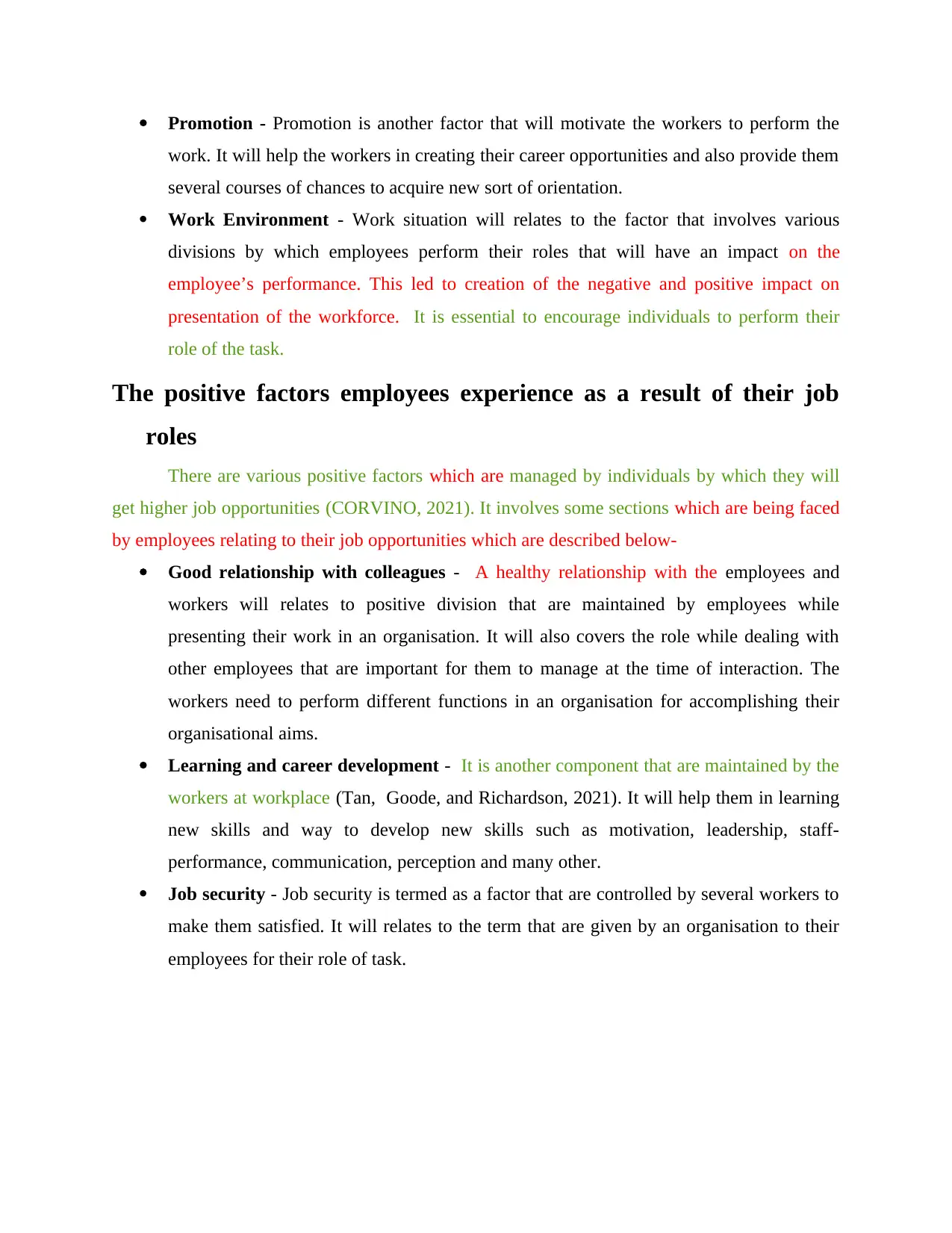
Promotion - Promotion is another factor that will motivate the workers to perform the
work. It will help the workers in creating their career opportunities and also provide them
several courses of chances to acquire new sort of orientation.
Work Environment - Work situation will relates to the factor that involves various
divisions by which employees perform their roles that will have an impact on the
employee’s performance. This led to creation of the negative and positive impact on
presentation of the workforce. It is essential to encourage individuals to perform their
role of the task.
The positive factors employees experience as a result of their job
roles
There are various positive factors which are managed by individuals by which they will
get higher job opportunities (CORVINO, 2021). It involves some sections which are being faced
by employees relating to their job opportunities which are described below-
Good relationship with colleagues - A healthy relationship with the employees and
workers will relates to positive division that are maintained by employees while
presenting their work in an organisation. It will also covers the role while dealing with
other employees that are important for them to manage at the time of interaction. The
workers need to perform different functions in an organisation for accomplishing their
organisational aims.
Learning and career development - It is another component that are maintained by the
workers at workplace (Tan, Goode, and Richardson, 2021). It will help them in learning
new skills and way to develop new skills such as motivation, leadership, staff-
performance, communication, perception and many other.
Job security - Job security is termed as a factor that are controlled by several workers to
make them satisfied. It will relates to the term that are given by an organisation to their
employees for their role of task.
work. It will help the workers in creating their career opportunities and also provide them
several courses of chances to acquire new sort of orientation.
Work Environment - Work situation will relates to the factor that involves various
divisions by which employees perform their roles that will have an impact on the
employee’s performance. This led to creation of the negative and positive impact on
presentation of the workforce. It is essential to encourage individuals to perform their
role of the task.
The positive factors employees experience as a result of their job
roles
There are various positive factors which are managed by individuals by which they will
get higher job opportunities (CORVINO, 2021). It involves some sections which are being faced
by employees relating to their job opportunities which are described below-
Good relationship with colleagues - A healthy relationship with the employees and
workers will relates to positive division that are maintained by employees while
presenting their work in an organisation. It will also covers the role while dealing with
other employees that are important for them to manage at the time of interaction. The
workers need to perform different functions in an organisation for accomplishing their
organisational aims.
Learning and career development - It is another component that are maintained by the
workers at workplace (Tan, Goode, and Richardson, 2021). It will help them in learning
new skills and way to develop new skills such as motivation, leadership, staff-
performance, communication, perception and many other.
Job security - Job security is termed as a factor that are controlled by several workers to
make them satisfied. It will relates to the term that are given by an organisation to their
employees for their role of task.
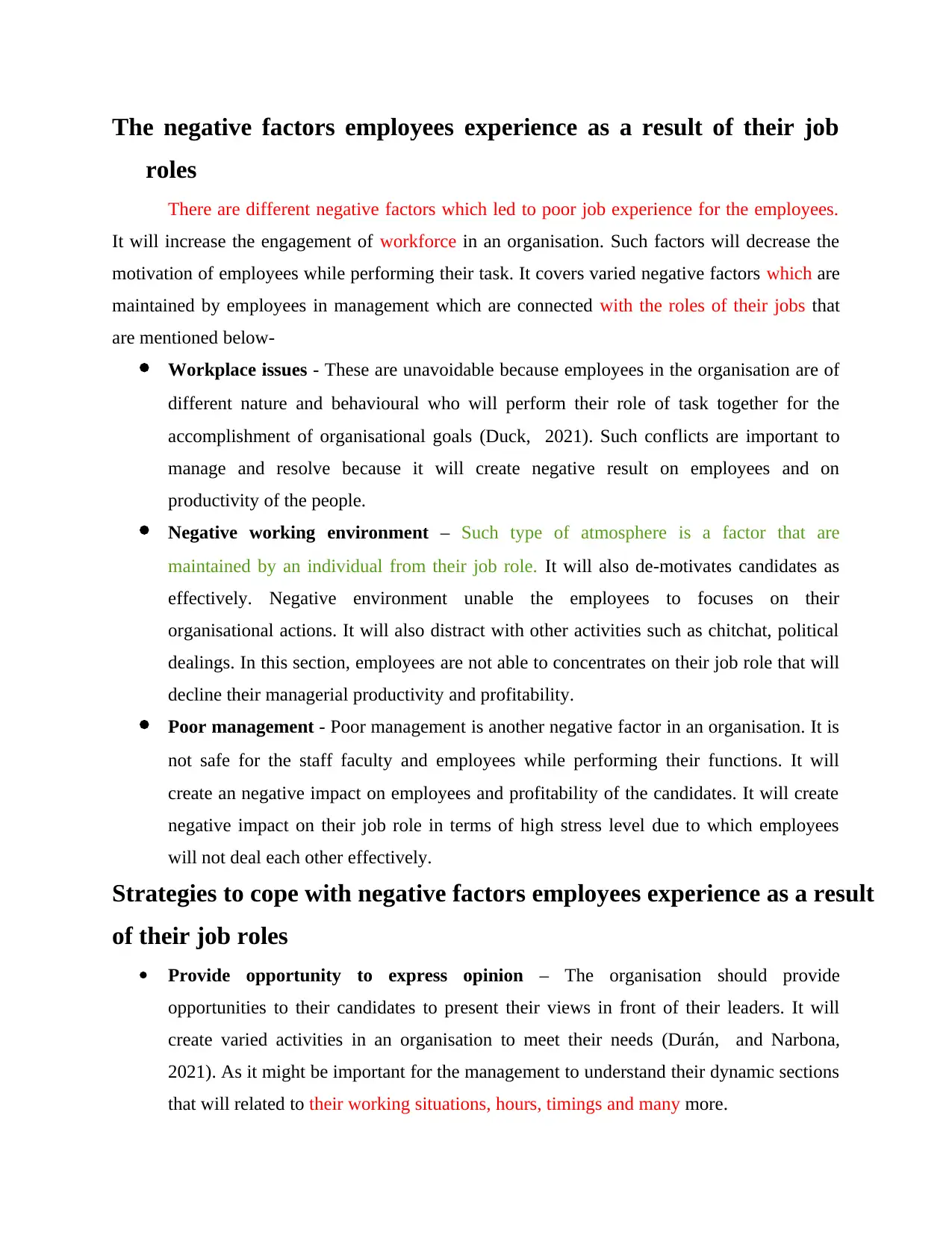
The negative factors employees experience as a result of their job
roles
There are different negative factors which led to poor job experience for the employees.
It will increase the engagement of workforce in an organisation. Such factors will decrease the
motivation of employees while performing their task. It covers varied negative factors which are
maintained by employees in management which are connected with the roles of their jobs that
are mentioned below-
Workplace issues - These are unavoidable because employees in the organisation are of
different nature and behavioural who will perform their role of task together for the
accomplishment of organisational goals (Duck, 2021). Such conflicts are important to
manage and resolve because it will create negative result on employees and on
productivity of the people.
Negative working environment – Such type of atmosphere is a factor that are
maintained by an individual from their job role. It will also de-motivates candidates as
effectively. Negative environment unable the employees to focuses on their
organisational actions. It will also distract with other activities such as chitchat, political
dealings. In this section, employees are not able to concentrates on their job role that will
decline their managerial productivity and profitability.
Poor management - Poor management is another negative factor in an organisation. It is
not safe for the staff faculty and employees while performing their functions. It will
create an negative impact on employees and profitability of the candidates. It will create
negative impact on their job role in terms of high stress level due to which employees
will not deal each other effectively.
Strategies to cope with negative factors employees experience as a result
of their job roles
Provide opportunity to express opinion – The organisation should provide
opportunities to their candidates to present their views in front of their leaders. It will
create varied activities in an organisation to meet their needs (Durán, and Narbona,
2021). As it might be important for the management to understand their dynamic sections
that will related to their working situations, hours, timings and many more.
roles
There are different negative factors which led to poor job experience for the employees.
It will increase the engagement of workforce in an organisation. Such factors will decrease the
motivation of employees while performing their task. It covers varied negative factors which are
maintained by employees in management which are connected with the roles of their jobs that
are mentioned below-
Workplace issues - These are unavoidable because employees in the organisation are of
different nature and behavioural who will perform their role of task together for the
accomplishment of organisational goals (Duck, 2021). Such conflicts are important to
manage and resolve because it will create negative result on employees and on
productivity of the people.
Negative working environment – Such type of atmosphere is a factor that are
maintained by an individual from their job role. It will also de-motivates candidates as
effectively. Negative environment unable the employees to focuses on their
organisational actions. It will also distract with other activities such as chitchat, political
dealings. In this section, employees are not able to concentrates on their job role that will
decline their managerial productivity and profitability.
Poor management - Poor management is another negative factor in an organisation. It is
not safe for the staff faculty and employees while performing their functions. It will
create an negative impact on employees and profitability of the candidates. It will create
negative impact on their job role in terms of high stress level due to which employees
will not deal each other effectively.
Strategies to cope with negative factors employees experience as a result
of their job roles
Provide opportunity to express opinion – The organisation should provide
opportunities to their candidates to present their views in front of their leaders. It will
create varied activities in an organisation to meet their needs (Durán, and Narbona,
2021). As it might be important for the management to understand their dynamic sections
that will related to their working situations, hours, timings and many more.
⊘ This is a preview!⊘
Do you want full access?
Subscribe today to unlock all pages.

Trusted by 1+ million students worldwide
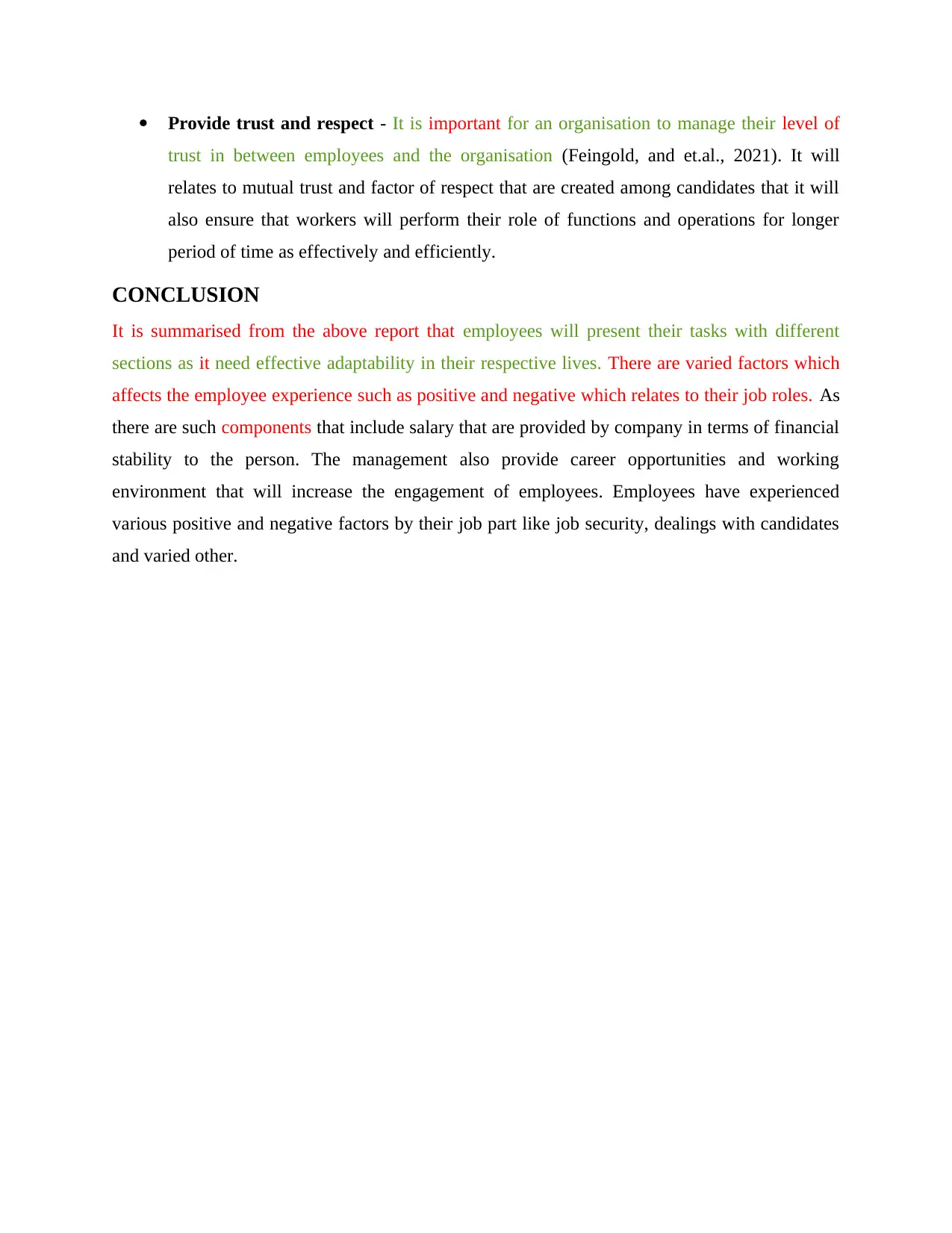
Provide trust and respect - It is important for an organisation to manage their level of
trust in between employees and the organisation (Feingold, and et.al., 2021). It will
relates to mutual trust and factor of respect that are created among candidates that it will
also ensure that workers will perform their role of functions and operations for longer
period of time as effectively and efficiently.
CONCLUSION
It is summarised from the above report that employees will present their tasks with different
sections as it need effective adaptability in their respective lives. There are varied factors which
affects the employee experience such as positive and negative which relates to their job roles. As
there are such components that include salary that are provided by company in terms of financial
stability to the person. The management also provide career opportunities and working
environment that will increase the engagement of employees. Employees have experienced
various positive and negative factors by their job part like job security, dealings with candidates
and varied other.
trust in between employees and the organisation (Feingold, and et.al., 2021). It will
relates to mutual trust and factor of respect that are created among candidates that it will
also ensure that workers will perform their role of functions and operations for longer
period of time as effectively and efficiently.
CONCLUSION
It is summarised from the above report that employees will present their tasks with different
sections as it need effective adaptability in their respective lives. There are varied factors which
affects the employee experience such as positive and negative which relates to their job roles. As
there are such components that include salary that are provided by company in terms of financial
stability to the person. The management also provide career opportunities and working
environment that will increase the engagement of employees. Employees have experienced
various positive and negative factors by their job part like job security, dealings with candidates
and varied other.
Paraphrase This Document
Need a fresh take? Get an instant paraphrase of this document with our AI Paraphraser
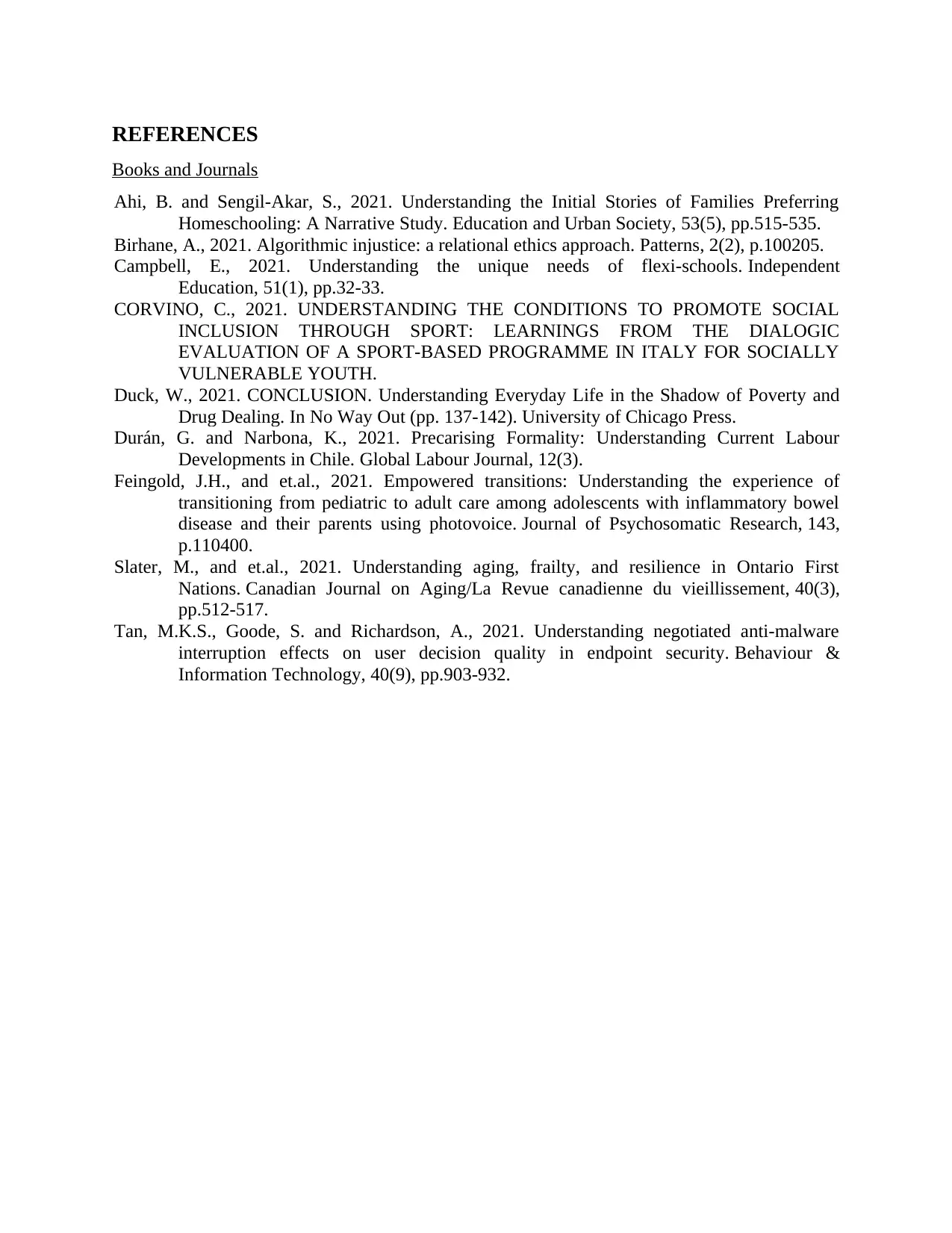
REFERENCES
Books and Journals
Ahi, B. and Sengil-Akar, S., 2021. Understanding the Initial Stories of Families Preferring
Homeschooling: A Narrative Study. Education and Urban Society, 53(5), pp.515-535.
Birhane, A., 2021. Algorithmic injustice: a relational ethics approach. Patterns, 2(2), p.100205.
Campbell, E., 2021. Understanding the unique needs of flexi-schools. Independent
Education, 51(1), pp.32-33.
CORVINO, C., 2021. UNDERSTANDING THE CONDITIONS TO PROMOTE SOCIAL
INCLUSION THROUGH SPORT: LEARNINGS FROM THE DIALOGIC
EVALUATION OF A SPORT-BASED PROGRAMME IN ITALY FOR SOCIALLY
VULNERABLE YOUTH.
Duck, W., 2021. CONCLUSION. Understanding Everyday Life in the Shadow of Poverty and
Drug Dealing. In No Way Out (pp. 137-142). University of Chicago Press.
Durán, G. and Narbona, K., 2021. Precarising Formality: Understanding Current Labour
Developments in Chile. Global Labour Journal, 12(3).
Feingold, J.H., and et.al., 2021. Empowered transitions: Understanding the experience of
transitioning from pediatric to adult care among adolescents with inflammatory bowel
disease and their parents using photovoice. Journal of Psychosomatic Research, 143,
p.110400.
Slater, M., and et.al., 2021. Understanding aging, frailty, and resilience in Ontario First
Nations. Canadian Journal on Aging/La Revue canadienne du vieillissement, 40(3),
pp.512-517.
Tan, M.K.S., Goode, S. and Richardson, A., 2021. Understanding negotiated anti-malware
interruption effects on user decision quality in endpoint security. Behaviour &
Information Technology, 40(9), pp.903-932.
Books and Journals
Ahi, B. and Sengil-Akar, S., 2021. Understanding the Initial Stories of Families Preferring
Homeschooling: A Narrative Study. Education and Urban Society, 53(5), pp.515-535.
Birhane, A., 2021. Algorithmic injustice: a relational ethics approach. Patterns, 2(2), p.100205.
Campbell, E., 2021. Understanding the unique needs of flexi-schools. Independent
Education, 51(1), pp.32-33.
CORVINO, C., 2021. UNDERSTANDING THE CONDITIONS TO PROMOTE SOCIAL
INCLUSION THROUGH SPORT: LEARNINGS FROM THE DIALOGIC
EVALUATION OF A SPORT-BASED PROGRAMME IN ITALY FOR SOCIALLY
VULNERABLE YOUTH.
Duck, W., 2021. CONCLUSION. Understanding Everyday Life in the Shadow of Poverty and
Drug Dealing. In No Way Out (pp. 137-142). University of Chicago Press.
Durán, G. and Narbona, K., 2021. Precarising Formality: Understanding Current Labour
Developments in Chile. Global Labour Journal, 12(3).
Feingold, J.H., and et.al., 2021. Empowered transitions: Understanding the experience of
transitioning from pediatric to adult care among adolescents with inflammatory bowel
disease and their parents using photovoice. Journal of Psychosomatic Research, 143,
p.110400.
Slater, M., and et.al., 2021. Understanding aging, frailty, and resilience in Ontario First
Nations. Canadian Journal on Aging/La Revue canadienne du vieillissement, 40(3),
pp.512-517.
Tan, M.K.S., Goode, S. and Richardson, A., 2021. Understanding negotiated anti-malware
interruption effects on user decision quality in endpoint security. Behaviour &
Information Technology, 40(9), pp.903-932.

⊘ This is a preview!⊘
Do you want full access?
Subscribe today to unlock all pages.

Trusted by 1+ million students worldwide

1 out of 10
Related Documents
Your All-in-One AI-Powered Toolkit for Academic Success.
+13062052269
info@desklib.com
Available 24*7 on WhatsApp / Email
![[object Object]](/_next/static/media/star-bottom.7253800d.svg)
Unlock your academic potential
Copyright © 2020–2025 A2Z Services. All Rights Reserved. Developed and managed by ZUCOL.


